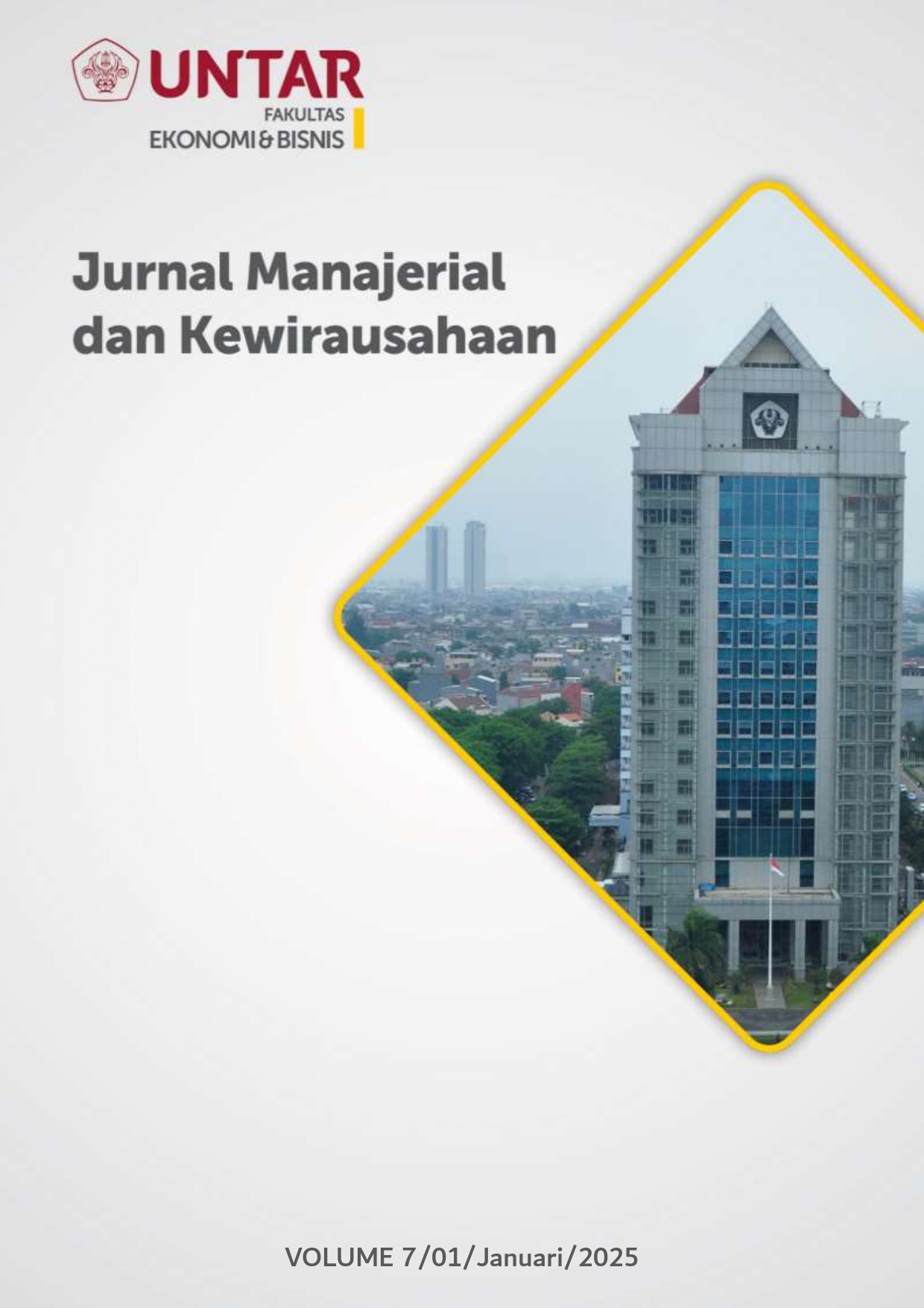Factors Influencing Customers to Stay Loyal in Playing E-Sports Games in Indonesia
Main Article Content
Abstract
This study aims to examine the influence of E-WOM, User Experience, and Brand Reputation on Customer Loyalty in Jakarta. Additionally, Customer Satisfaction is considered as a mediating variable for E-WOM, User Experience, and Brand Reputation on Customer Loyalty. The sample for this research consists of 139 respondents residing in Jakarta and playing Mobile Legends. Respondent data were collected through an online questionnaire distributed on social media using non-probability and convenience sampling techniques. The collected data were processed using PLS-SEM assisted by SmartPLS version 3 software. The results obtained from this study indicate that E-WOM has an influence on Customer Satisfaction. User Experience has an influence on Customer Satisfaction. Brand Reputation has an influence on Customer Satisfaction. Customer Satisfaction has an influence on Customer Loyalty. E-WOM has an influence on Customer Loyalty. User Experience does not have an influence on Customer Loyalty. Brand Reputation does not have an influence on Customer Loyalty. E-WOM has an influence on Customer Loyalty through Customer Satisfaction. User Experience has an influence on Customer Loyalty through Customer Satisfaction. Brand Reputation does not have an influence on Customer Loyalty through Customer Satisfaction. The results of this research are consistent with the Technology Acceptance Model (TAM) theory.
Article Details
Section

This work is licensed under a Creative Commons Attribution-NonCommercial-ShareAlike 4.0 International License.
This work is licensed under a Jurnal Muara Ilmu Ekonomi dan Bisnis Creative Commons Attribution-ShareAlike 4.0 International License.,/p>
References
Andreassen, T. W. & Lindestad, B. (1998). Customer Loyalty and Complex Services: The Impact of Corporate Image on Quality, Customer Satisfaction, and Loyalty for Customers with Varying Degrees of Service Expertise. International Journal of Service Industry Management, 9(1), 7-23. https://doi.org/10.1108/09564239810199923
Badran, O. & Al-Haddad, S. (2018). The Impact of Software User Experience on Customer Satisfaction. Journal of Management Information and Decision Sciences, 21(1), 1-20.
Chang, K. C. (2013). How Reputation Creates Loyalty in the Restaurant Sector. International Journal of Contemporary Hospitality Management, 25(4), 536-557. https://doi.org/10.1108/09596111311322916
Demir, Y., & Kumcağız, H. (2019). Investigating The Effects of Several Variables on University Students’ Social Media Addiction. Turkish Psychological Counseling and Guidance Journal, 9(52), 23–42. https://dergipark.org.tr/tr/pub/tpdrd/issue/44557/550132
Hair et al (2014). Partial Least Squares Structural Equation Modeling (PLS-SEM): An Emerging Tool for Business Research. European Business Review. 10.1108/EBR-10-2013-0128
Huotari, K., & Hamari, J. (2012). Gamifikasi dari perspektif pemasaran jasa. Dalam Prosiding Lokakarya Gamifikasi CHI 2011, Vancouver, BC, Kanada.
Ilyas, M. R., Dirgantara, I. M. B., & Januardi, N. V. (2022). Pengaruh Penggunaan Aplikasi Pegadaian Digital dan Kualitas Pelayanan terhadap Loyalitas Pelanggan dengan Kepuasan Konsumen Sebagai Variabel Intervening (Studi pada PT. Pegadaian (Persero) Kantor Wilayah Semarang). Diponegoro Journal of Management, 11(4).
Itasari, A. A., Hastuti, N. H., & Supriyadi, A. (2020). Pengaruh Word of Mouth, Electronic Word of Mouth dan Kualitas Pelayanan Terhadap Kepuasan Pelanggan. ETTISAL J. Commun., Vol. 0, No. 0, 52–59.
Jastine, V. (2020). Pengaruh dari Brand Trust, Brand Image, dan Reputation terhadap Brand Loyalty Kopi Lokal di Jakarta
Lyna, L., & Prasetyo, S. I. (2021). Pengaruh Website Quality, Customer Experience, dan Service Quality Terhadap Loyalitas Pelanggan Online Shop Lazada di Kota Surakarta. INVEST: Jurnal Inovasi Bisnis Dan Akuntansi, 2(1), 53–63. https://doi.org/10.55583/invest.v2i1.133
Manyanga, W., Makanyeza, C., & Muranda, Z. (2022). The effect of customer experience, customer satisfaction and word of mouth intention on customer loyalty: The moderating role of consumer demographics. Cogent Business and Management, 9(1). https://doi.org/10.1080/23311975.2022.2082015
Mohamed Ali Barakat Ali, (2022). "The Effect of Firm's Brand Reputation on Customer Loyalty and Customer Word of Mouth: The Mediating Role of Customer Satisfaction and Customer Trust," International Business Research, Canadian Center of Science and Education, vol. 15(7), pages 1-30,
Mukhlis, & Indriastuti, H. (2021). Customer satisfaction through customer loyalty and customer experience: survey of go-ride mulawarman customers. International Journal of Economics, Business and Accounting Research (IJEBAR), 5(2), 54–62. https://jurnal.stie-aas.ac.id/index.php/IJEBAR
Mustamiin, M. Z. (2019). “Konseling Individu dengan Sikap Kecanduan Game Online Mobile Legend pada Siswa”. Jurnal Visionary: Penelitian Dan Pengembangan Dibidang Administrasi Pendidikan, Vol 7, No1, hal. 4.
Nawastuti, N., & Irmawati. (2023). Pengaruh Influencer dan E-WOM terhadap Loyalitas Pelanggan Melalui Kepuasan Pelanggan sebagai Variabel Mediasi Pada Pelanggan TikTok Shop. Jurnal Informatika Ekonomi Bisnis, 5(4), 1415-1421. https://doi.org/10.37034/infeb.v5i4.735
Nelviluvita & Karunia, H. (2023) Pengaruh User Experience Aplikasi Sayurbox terhadap Repurchase Intention (Moderasi: Kelompok Usia), Jurnal Manajemen Bisnis dan Kewiarusahaan, Vol. 7, No. 5, pp. 1035-1047.
Pratnyawan, A. & Rachmanta, R. D. (2019). Sebaran Pemain Mobile Legends Indonesia 2021. https://www.suara.com/tekno/2021/08/12/142903/sebaran-pemain-mobile-legends-indonesia-terbanyak-di-pulau-ini?page=all.
Suprajang, S. E., Nirwanto, N., & Firdiansjah, A. (2019). The Influence of the EWom and Service Quality towards Customer Loyalty through Customer Satisfaction on Natural Tourist Destinations in Blitar Regency, East Java, Indonesia. IOSR Journal of Business and Management (IOSR-JBM), Vol. 21, No. 1, pp. 39–44. https://doi.org/10.9790/487X-2101043944

